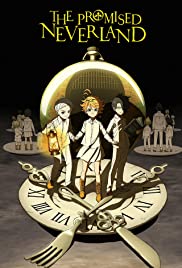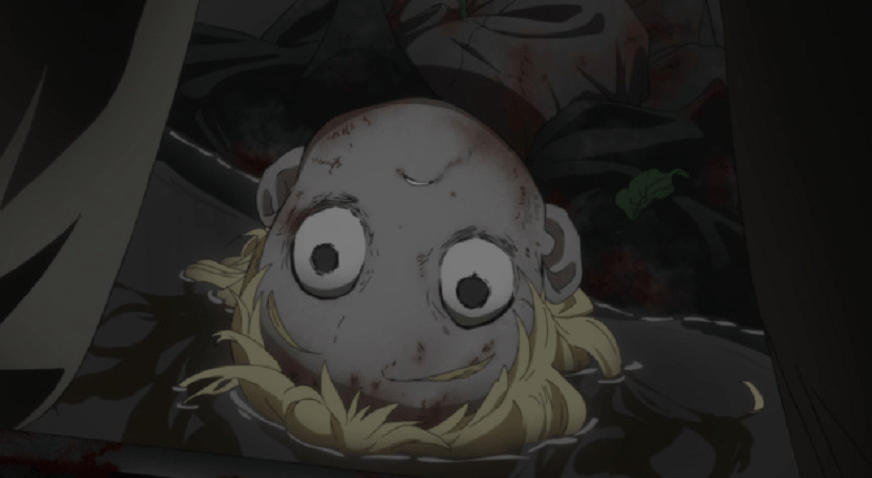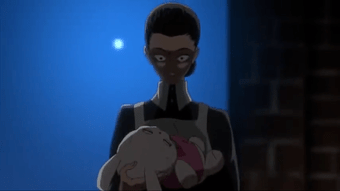Hey everyone, it’s Kern here. Before I begin, I want to make it clear that I will be discussing The Promised Neverland anime at length. I will not diving deep into the manga on this review. I will be mentioning it, but not actually reviewing it. The written media for this series is amazing, and quite frankly it needs it’s own spot here on the blog.
The reason the anime for this series is so good in season one isn’t the same reason why the manga is also wonderful. They are very different ways to enjoy this story, and it would diminish both works to compare them in a single review.
This is not an anime made for young viewers, and thus some of the themes depicted in the series might be considered disturbing. That is the nature of this anime, you have been warned.

The Promised Neverland is a story that caters to older viewers who enjoy darker tales. It isn’t squeamish about cutting to the core of emotional uncertainty. It doesn’t pull any punches either. This anime is terrifying due to the nature of its implications.
What makes this series so good, is that it doesn’t try to craft a narrative too big for its own good. With tightly packed pacing, it manages not to feel rushed. The themes are dark, but I see no reason to sugar coat things. The anime isn’t subtle about it, so I won’t be either.
The majority of this story revolves around children being raised to be consumed like cattle. This is contained in a society that no longer runs on the strength of mankind alone. Intelligent demons inhabit the world, and they eat humans. If that bothers you, don’t watch this series.
Anime like this one has the gift of animation on its side. If this were a live action, I wouldn’t be able to watch it. The show would border on the line of too inhumane, and absolutely revolting. The fact that it is an anime lends a certain power to its creation, and more accessibility because of it.
After all, not everyone reads manga. There are anime only fans out there, and this first season offers plenty to enjoy for those who like this sort of unsettling story.
That being said, if you do read manga, don’t bypass this one. The Promised Neverland has one of the richest experiences in the written media that I’ve ever come across.
The Story: Removing Childlike Innocence
The general idea of the plot is as trite as you’d expect it to be, if you went by the simple plot synopses. This anime is far from trite and doesn’t much care who it offends as it spins its twisted tale of an orphanage gone wrong.
Basically these seemingly orphaned children are raised at an isolated and incredibly idyllic facility. This place is known as the “Grace Field House”. Unfortunately a few of the smart children discover the secret of this orphanage. It’s not a paradise, it’s hell on earth. With demons running society, their sinister reason for existence soon becomes clear.

These children are raised for purpose of becoming meals, no better than pigs to the slaughter. They’re killed to become food.
This is what they were raised for. Terrified of this, the children of the orphanage rally together in order to escape. This is not made easy. Their caretaker, who they call “Mama”, grew up in a home not unlike this one. She knows all of their tricks, and it becomes a battle of wits to see if the children can escape successfully or not.
Ultimately this the main drive of the story, at least so far as the first season is concerned. The entire thing is wrapped in beautiful animation. The atmospheric soundtrack truly distinguishes itself fittingly in the world of the show. If you’re an anime only fan, the show won’t do you wrong.
The series is directed by Mamoru Kanbe and written by Toshiya Ono during season one. You can clearly see the love and care poured into the series by the team at ColverWorks.
I know many find the manga to be far superior when it comes to the story and how it plays out. However, I’d beg to disagree. It comes down for a simple question for me. Ju
It’s certainly a psychologically bent show, but in what way is it best enjoyed? This brings me to the crux of many disputes regarding the anime. Do you want it to be a horror or a thriller?
The best choices really comes down to that.
Horror or Thriller?
The Promised Neverland is both of these things, but when it comes to the anime it is far more a thriller than it’s manga counterpart. The manga is more terrifying, each turn of the page offers a better shock value.
I couldn’t possibly bring myself to care about that, but I can see the appeal. If you want The Promised Neverland to feel more like a true horror story, you should read the written media. If you want it to feel more like a suspenseful thriller, the anime is superior in every way.
The anime itself takes a different approach. It isn’t trying to shock or awe you with every narrative twist and turn. Rather, it places these plot twists in front of you and asks you to absorb them quickly. Instead of initial shock, you’re expected to keep up with the anime. You don’t have much time to analyze every tiny detail on screen.
The manga asks you to savor every moment, the anime pushes you along for the ride. In that way, viewers are more akin to the children trapped in the orphanage.
For the characters, there is no time to over think every little detail, and outwitting their “Mama” becomes a constant chore. It means the difference between life and death.
For the viewer, the anime offers feeling of urgency that is controlled and contained as every second ticks by.
Written media just can’t promise to provide the same inherent urgency on rails. That all comes down to the pacing of a reader. Faster readers will blow through the content very quickly, and if you’re like me that’s a downfall.
Therefore, the anime experience is one I find far more enjoyable. I get more out of the vocal acting, musical composition, animation style and general pacing of the show than I did from the horror aspect of the manga itself.
Now let me be clear, when it comes to story line, that is entirely a different issue. As of season two the story-line diverts heavily. It has split the fandom in ways season one never did. If you want the full manga story-line, you will not find that in the anime as of season two. You must read the written media to fully enjoy that side of the story.
This is why I must also separate the reviews for this series. Season two is still ongoing, and that’s a discussion for another time.
Characters: Wonderfully Conceptualized, Poorly Executed.
For me, the characters are the worst part of the series in absolutely every way. Characters are handled a little bit better in the written media, but not much. The anime has character failings in spades, and I can easily explain why.

There are many characters in this anime. During season one, most of them are under the age of eleven.
There are only two adults that have any reasonable merit in season one, and both of them are villains. The rest are demons that rarely have screen time at all. What this does is put the viewer into the mind of childish fears and ambitions to resist against authority.
Yet, this series was not made for children. Therefore, typically it would be hard to relate to them as an adult viewer. Only a story appealing to a true sense of danger would give a viewer something to latch onto.
You either have a concept of empathy and recall what childhood was like, or you don’t. You must suspend your disbelief that these young kids could outsmart and outmatch their greatest danger in season one.

Mama Isabella was groomed for her position at the orphanage. She was militantly raised to be superior in every way.
All in all, there’s two choices. Allow the kids to win the day, or let them all die and become demon chow. We know the show isn’t going to murder them all off, so plot armor it is!
This is just another tired old trope to be honest. I find it a little lazy. Especially when it comes to the way certain events play out. Mama Isabella can cripple these children thoughtlessly, and flat out does do that to one of them.
The whole idea behind the “Grace Field House” is that children are the most flavorful and delicious when they’re raised in a happy environment. Free of extensive emotional turmoil. This house provides some of the best human meat available.
Well, that just craps all over the idea that you could break a little girl’s shin, now doesn’t it?
By the time the children are ready to escape, they’ve seen enough of what hell on earth looks like. With that kind of emotional upset, they certainly wouldn’t taste very good. They’d likely be no better than scrap meat at this point. This is what I mean by you just have to suspend disbelief.
Other than the narrative of the world itself, you’d simply watch the show for the sake of hoping the children would be okay. Frankly, that’s a piss-poor narrative to strive for. After all, the main three children aren’t exactly easy to relate to. I doubt many of us were the brightest, most athletic, and top of our class as children.
Thankfully, the anime seems to understand this.
The story appeals to a near parental urge to hope these children beat the odds, but this is still a dystopia and the viewer knows it. Connecting with the characters becomes even more difficult if you think they’ll end up dead and turned into food.
So, to me the characters are flat out the weakest thing this series has to offer. Are they awful? No, not at all. However, they aren’t in the least bit relatable either.
We see this in anime all the time though, and it’s just the way things go. It’s not a deal breaker, it’s just a fact of this type of story.
In Conclusion
The Promised Neverland is a good series, but it is not a masterpiece. I love it, and I do highly suggest it to fan of darker storytelling. It’s great for what it is, but you’ll have to forgive it for what it isn’t.
That said, there is a lot of baggage that you see whenever you pull off the “fan goggles” and really look at the series maturely. It doesn’t stand up to scrutiny, like other anime of its type.
The series has flaws, gaping holes in logic, and a habit of being so far up it’s own ass with its narrative, that it doesn’t see any of it. It’s trying to tell a mature story, but in some ways it’s so childish in its handling of serious situations that it feels like an “edge-lord” tried to write it.
That being said, it’s still vastly entertaining. I know I sound almost ruthless in my critiques, but that comes from watching way too many anime in my life and knowing what I like.
I like The Promised Neverland, and it is completely worth your time to give it a try. However, it won’t ever be an anime that sits proudly on my open shelf. Nope, it’s in an old VHS/DVD cabinet. That’s where I store the majority of the shows that I don’t re-watch very often and have no desire to display.
A word of advice. If you’re going to watch this series, don’t look for any real depth. The character moments can be contrived at times, and others they’re just flat out stupid.
This is a pop-corn anime, philological horror or not. For me, that’s all it can ever be. The thing is, I’m perfectly fine with that. I enjoy this series, and I know others will too.
This has been Kernook of The Demented Ferrets, where stupidity is at its finest and level grinds are par for the course. I’ll see you next time.
Meanwhile, check out some of our other great content below. You can also find more information about supporting us at the bottom of this post.
With your contributions, you make our efforts possible. Thank you for supporting our content. Patreon supporters receive access into our official Discord server, and a few other perks depending on the tier. If you don’t care for Patreon, and don’t care about perks, you can always support us through PayPal too… links below.
Those who join via Patreon get special perks, such as extra content, quicker updates, and more.
Patreon Supporters:
($3) Little Ferrets: None
($5) Demented Minions: Francis Murphy and Andrew Wheal.
($7) Fandom Ferret: None
($14) True Blue Ferret: None.
($25) Premium Ferret: None.
($50) Round Table Ferret/Fluffy Ferret: Josh Sayer




[…] Brothers – [Anime]Subway Surfers – [Game]Sweetness and Lightning – [Anime]The Promised Neverland – [Anime]The Shawshank Redemption – [Movie]The Static Speaks My Name – [Game]Uniracers: Bombastic […]
LikeLike
[…] Surfers – [Game]Sweetness and Lightning – [Anime]The Godfather – [Movie]The Promised Neverland – [Anime]The Shawshank Redemption – [Movie]The Static Speaks My Name – [Game]Uniracers: Bombastic […]
LikeLike